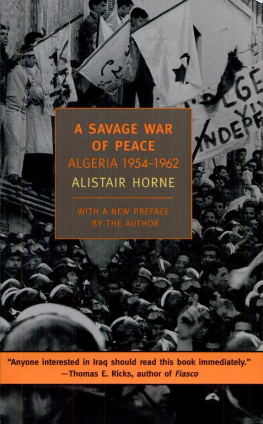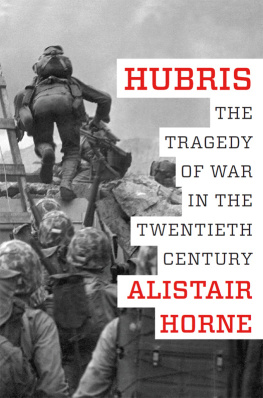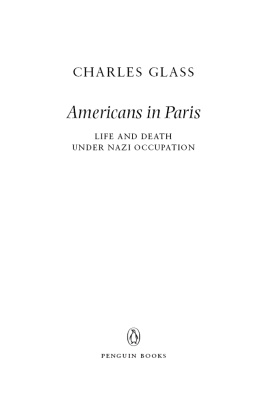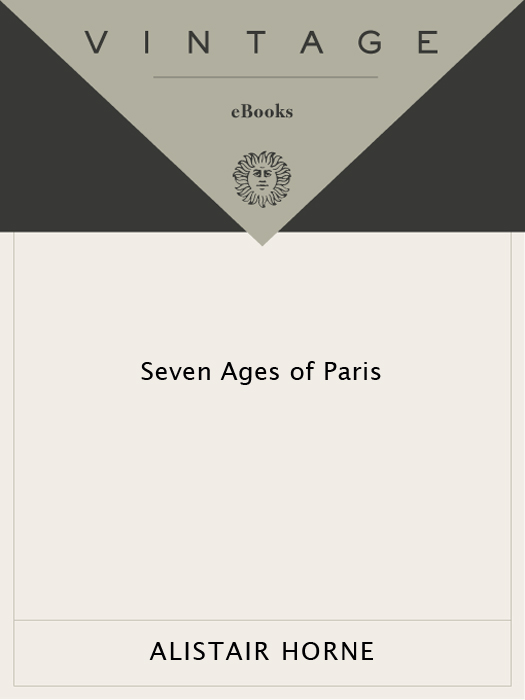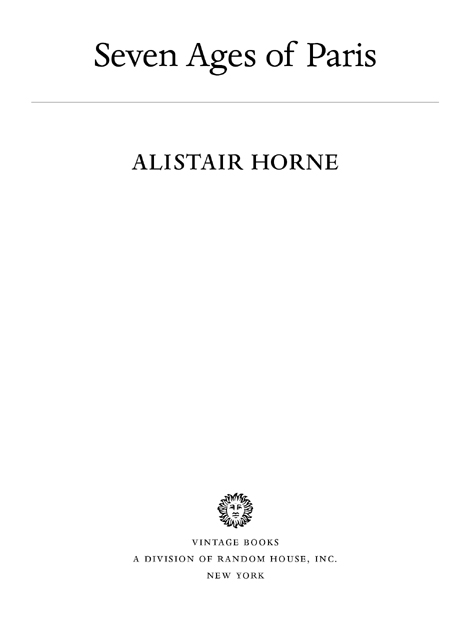Acclaim for Alistair Hornes
Seven Ages of Paris
How much happier life would be if one could read books as riveting as Alistair Hornes Seven Ages of Paris every week of the year. Horne has a masterful way of infusing grand historical themes with rich narrative detail. His chronicle of the cultural and political forces that have shaped Paris over the past millennia is a dazzling, engrossing work.
Francine du Plessix Gray
Excellent. Horne, one of the most graceful and satisfying of historians, seems to know every place and curbside in Paris. He has, you feel, walked every inch of Paris, and his book is a veritable tour of the city from the ground up.
Milwaukee Journal Sentinel
A rich, seething history lesson that gives more life to the arrondissements and sites of a great city.
Associated Press
Paris is what you bring to it, and Mr. Horne brings his broad erudition and intense feel for French history. He not only understands the political passions that made the city the inescapable center of Frances life but, more subtly, the poetry and music of the citys air.
The Washington Times
Outstanding. Mr. Hornes book is ideal for reading just before or after a trip to Paris, with its expansiveness and store of detail, its richness of personal and historical knowledge of the City of Light.
The Dallas Morning News
An authoritative thousand-year history; twenty-five years in the making.
New York magazine
Exciting. Hornes history of Paris is tantamount to a history of France. Readers will agree with Maurice Druon, who writes in the foreword, Horne is everywhere and knows everything.
Providence Journal
Weaves fascinating anecdotes and trivia, ancient rumors about naughty royals and well-researched military, political and cultural history into an engrossing paean to the City of Light.
Town and Country
[Horne] is a master storyteller who regularly shows that lively, interesting writing and good history are completely compatible. This is a terrific book, a must for anyone who loves history or Paris, much less both.
Greenwich Time
Horne is at once readable, insightful and most helpful with appropriate asides and well-chosen quotations and anecdotes that illustrate a viewpoint. His is a work worth keeping and sharing with future generations.
The Decatur Daily
Full of entertainingand enlighteninganecdotes, this engrossing book traces the City of Light from its beginnings as a muddy Roman outpost to the heady days of May 68.
France Magazine
What is charming about this book is that it can serve both as a rough guide to historical Paris (what remains of it), as well as provide an architectural summary of what the rest of the world knows.
The Denver Post
FIRST VINTAGE BOOKS EDITION, APRIL 2004
Copyright2002 by Alistair Horne
All rights reserved under International and Pan-American Copyright Conventions. Published in the United States by Vintage Books, a division of Random House, Inc., New York. Originally published in Great Britain by Macmillan, an imprint of Pan Macmillan Ltd., London, and subsequently published in hardcover in the United States by Alfred A. Knopf, a division of Random House, Inc., New York, in 2002.
Vintage and colophon are registered trademarks of Random House, Inc.
The Library of Congress has cataloged the Knopf edition as follows:
Horne, Alistair.
Seven ages of Paris / Alistair Horne.
p. cm.
Includes bibliographical references.
ISBN 0-679-45481-0 (alk. paper)
1. Paris (France)History. I. Title: 7 ages of Paris. II. Title.
DC707 .H74 2002
944.361dc21
2002029653
eBook ISBN: 978-0-8041-5169-6
Trade Paperback: 978-1-400-03446-8
Author photograph Jerry Bauer
www.vintagebooks.com
v3.1
For Nicky
Good friend, and ally, of many years;
best of publishers for nearly forty
Contents
Foreword
by Maurice Druon
Over and above their rivalries and their ententes, for nearly a thousand years France and England have exercised upon each other a reciprocal attraction, almost a fascination. The evolution of their history, institutions and literature has been, for leading intellectuals of the two countries, a constant object of contemplation, of study andif one may say soof delight. For our generation Alistair Horne stands in the first rank of this elite.
Among the twenty-odd books which (apart from the official biography of Harold Macmillan) have established his fame, a large part, such as How Far from Austerlitz? Napoleon 18051815; The Terrible Year: The Paris Commune 1871; The Price of Glory: Verdun 1916; and A Savage War of Peace: Algeria 19541962, have had as their subjects episodes of French history. Alistair Horne has no need to be introduced to the public. His renown precedes him.
In doing me the honour of asking me to write a foreword to Seven Ages of Paris, he wanted (I felt) only to offer me the opportunity to express once more the gratitude that I cherish, since the commitments of my youth, towards Great Britain and the heroic city of London, which were, during the worst ordeals of the last century, the ultimate refuge of our honour and the citadel of our liberty. It requires, however, no effort at all from me to express my admiration for the substantial book of which I have had the advantage of being one of the first readers. It will remain, I believe, Hornes most outstanding work.
Devoting many years to its preparation, he has poured into it all the knowledge acquired through his earlier works. He has consulted every possible source, not only French and English, but European and even American. He has brought to light accounts that have generally been ignored, and that are often out of the ordinary. His researches demanded innumerable visits to Paris, wherea tireless walkerhe has endeavoured to tread upon the very soil that bears the footprints of the personalities he describes, and where there occurred the events which he narrates. Not a single century holds any secrets from him.
In retracing the history of Paris, from its most distant origins, Roman as well as Gallic, he offers us, in effect, a new history of France herselfa personalized history, and one that is very captivating to read. For Alistair Horne is a storyteller as well as a historian. When he writes history, he tells us a storysuperbly and dramatically. He has perfectly grasped the wavelike continuum in Frances destiny, which travels incessantly from the heights to the depths, becausethough the French have always jibbed at reformthey have repeatedly been ready to throw themselves into adventures and revolutions. It required supermen to make Frances destiny go forward, or to be masters of it.
With every sound intuition, Horne dates the first great epoch of Paris from the reign of Philippe Auguste. Precocious genius in the art of power and a formidable medieval strategist, Philippe Auguste was obsessed by the unity of the territory. In order to govern his kingdom firmly, he needed a vast, active and powerful capital which was solidly fortified. The same necessity imposed itself on his grandson, Saint Louis, himself obsessed by the unity of law, and upon Saint Louiss own grandson, Philippe le Bel, who devoted his efforts towards the unity of the state. Those three rulers invented the nation, with its irreversible characteristics, and that centralizationbased on Pariswhich still marks France.



